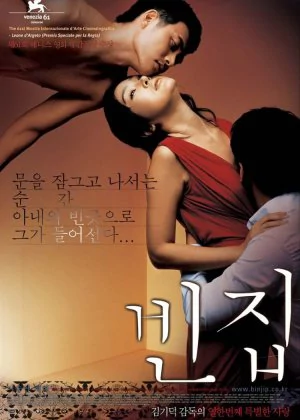3-Iron
3-Iron [Bin-jip] is the kind of old favorite I loved back when it was released, but haven't seen since. Returning to a film like that is always somewhat of a gamble. If things turn out all right you may rediscover the beauty of such a film, but there's also a chance that you end up realizing either your taste has changed through the years or time nibbled away at its beauty. In 3-Iron's case, I fell in love with the film all over again.
![screen capture of 3-Iron [Bin-jip]](/thumbs/img/articles/1200xauto/3-iron-1.webp)
Kim Ki-duk (Hwal, Pieta, Bi-mong, Breath) is still a big favorite of mine. 3-Iron is one of his most highly regarded films to date, which is quite a feat considering it was the follow-up to Bom Yeoreum Gaeul Gyeoul Geurigo Bom (at least in the West, Samaria took a little longer to reach us). Soon after people started to lose interest in Ki-duk, reasoning that the man kept repeating himself. But anyone who has seen a few of his older films knows that is a pretty dodgy explanation, as Ki-duk has been making similarly themed and styled films a long time before 3-Iron was conceived. Timing is everything I guess.
Even though 3-Iron is a pretty soft-natured film, it's one of the most hardcore executions of Ki-duk's trademark style, with the two main characters not uttering a single word throughout the entirety of the film and a fantastical, surreal ending that runs almost twenty minutes long. And yet (unless you can't stand the silence) it's also one of his more accessible films, with loveable characters and a lack of excessive violence and cruelty.
The story follows a young boy (Tae-suk) who goes from house to house. Thanks to a sly leaflet trick he figures out which houses are empty and spends the night there. He doesn't just leech off his unsuspecting hosts though, as he regularly fixes things and cleans up after himself. Everything goes well until one day when he runs into a victim of domestic violence. He is found out, but the woman (Sun-hwa) doesn't run away from him. Instead, they take their revenge on the husband and continue their journey together. At least for a short while, the two manage to live in harmony.
![screen capture of 3-Iron [Bin-jip]](/thumbs/img/articles/1200xauto/3-iron-2.webp)
Visually this isn't one of Ki-duk's strongest films, even when the framing is stark and beautiful and some of the shots do jump out. The first-person camera work during the finale is pretty effective too, but apart from that it can look a bit drab and lifeless. The combination of an everyday setting with the lack of lighting trickery makes for some pretty plain visuals. It's not bad, it's all functional, but Ki-duk has made better-looking films.
The soundtrack is something else. Even though the larger part of the score is what you'd expect from an Asian drama (subtle and soothing piano/ambient music), there is one particular Middle-Eastern song that feels oddly out of place but is used to great effect. Ki-duk uses it as his main motive, featuring the song at various points during the course of the film. It's an odd choice all right, but characteristic for Ki-duk and it really works wonders.
The acting too is impressive. While some of the secondary roles leave a little to be desired (I'm not a fan of Hyuk-ho Kwon, who plays Sun-hwa's husband), the focus lies firmly on the two main characters. Seung-Yeon Lee does an awesome job as Sun-Hwa, but it is Hyun-Kyoon Lee who deserves the most credit. Both of them form the perfect proof that you don't need dialogues to convey emotions. On the contrary even. While their actions may seem strange and hard to explain at first, it's surprisingly easy to understand their motives and grow attached to the pair of them.
![screen capture of 3-Iron [Bin-jip]](/thumbs/img/articles/1200xauto/3-iron-3.webp)
Around halfway through Tae-suk and Sun-hwa are apprehended by the police. Their reluctance to talk doesn't help their case and it ultimately drives them apart. This could've been the start of a dramatic finale, instead, Ki-duk comes with a more fantastical continuation of the story that will ultimately lead to one of the most iconic poster images of the past 20 years. It's a damn neat twist and one of the only instances where Ki-duk went with a happy ending for one of his films, so it should be savored.
3-Iron is a silent journey, following two characters who don't talk to each other directly, but understand each other's feelings all too well. To be a witness to that feels like something special. While visually somewhat plain, the strong soundtrack and superb acting make it easy to fall in love with this film. While not my favorite Ki-duk, it's definitely one of his better films and a rightful modern classic that survived its first 10 years in existence remarkably well.
